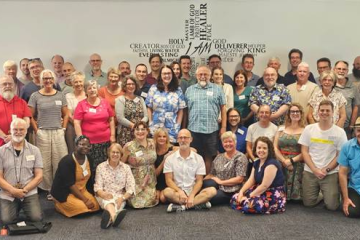Hebrews 4: 12-16, Psalm 119
As a congregation, we are working our way through series on spiritual practices – based on Soul Feast by Marjorie Thompson – that Christians over the centuries have discovered and developed and practiced themselves in order to know God more deeply, more responsively, more transformatively (not actually a word, but you know what I mean).
And it has been a feast for the soul or perhaps, more accurately, a degustation meal for the spirit where each week we have carefully, appreciatively ‘tasted’ each practice, focusing on how it might be digested into our lives, how it affects our senses and our experience of God, and being enriched by each other’s experiences of these practices.
And the good news is we are only half way through this meal. We have had four courses; hospitality, worship, fasting and confession, and we have four to go; spiritual reading, spiritual direction and reclaiming the Sabbath. In the bulletin you’ll see that there’s also an opportunity, on the 6th April, to lay all the courses on the table and to think about a menu that will sustain and feed your spiritual appetite going forward.
And in our service today we partake of ‘spiritual reading’ – an approach to the scriptures and also to other sources of devotional reading that differs from what we might think of as Bible study and yet will be familiar to all of us who have ever had a verse or a word leap out of the pages of Scripture and into our lives.
Because what Thompson asks us to do is to think of God’s Word – not as this (image of textbooks) something to be studied – but as this (image of letters) a letter written personally to us. Imagine, she says, “that you have just received a handwritten letter from a dear friend who lives at a great distance and from whom you have not heard in a long while.”
Many of you will have to imagine this because hand written letters are something of a rarity. And there is enough research around to confirm what we probably know, that with the immediacy and frequency of newer forms of communication, something has been lost. That the physical act of writing and the greater value that was placed on producing and receiving written communication, encouraged deeper thinking and better writing.
But I can remember receiving such letters. I have a bundle just like these written to me by a certain young man who was overseas studying in Kyoto for a year, and I can recall getting home from work, opening the letter box and the excitement of seeing a pale blue aerogramme; then making myself a cup of tea and sitting at the table or on the back step and, only then, opening the letter and savouring, slowly, as Thompson says, “the words, phrases and images written specifically for me…words that [brought] a sense of [my] friend’s presence vividly into [my] life.”
There is a place for studying scripture, for learning about the history and culture and original languages, for using a variety of critical disciplines to exegete the text. But if we desire to meet with God, and to have God meet with us, not just have a greater understanding of the text, we must take time, as Colossians says, to let the word of God dwell in us richly. We must make time for spiritual reading as well textual study.
Thomas Merton, the Trappist monk and writer, describes the relationship between spiritual reading and informational reading this way. To gain an adequate grasp of the biblical text, he writes, “requires two levels of understanding: first, a preliminary unravelling of the meaning of the texts themselves…which is mainly a matter of knowledge acquired by study; then a deeper level, a living insight which grows out of personal involvement and relatedness…Only on this second level is the Bible really grasped.”
Dietrich Bonhoeffer – who warned young pastors not to substitute sermon preparation for their own spiritual reading – writes, “The Word of Scripture should never stop sounding in your ears and working in you all day long, just like the words of someone you love. And just as you do not analyse the words of someone you love, but accept them as they are said to you, accept the Word of Scripture and ponder it in your heart, as Mary did. That is all. That is meditation.”
I don’t know about you, but I think the events of the last couple of days – the evidence of so much hate and so much hurt – have reminded me afresh that if we are serious about being the people of God, we need God, and we need to allow, as Bonhoeffer says, the Word of God to work in us, to shape us and reshape us into God’s people. For as my favourite Christian writer, Barbara Brown Taylor says, “When [this] culture encourages me to think of myself as a rugged individualist, the Bible calls me to be a neighbour. When [this] culture conditions me to become a spectator on life, the Bible bids me to do justice and love mercy and walk humbly with my God. Over and over the Bible offers me an alternative vision, not only of myself but also of other people and ultimately of the whole world.”
So as people who know their need for God and for an alternative vision of this world, how do we do about this practice of spiritual reading?
There are many ways, and in a moment, Bev is going to tell us about a couple, but all of them, like the reading we just did of Psalm 19, borrow from the classical form of Lectio Divina, which many of you have hear of. This method, as Martin outlined in the pastor’s note, has four phases.
Firstly, lectio (reading) where just like reading a letter from a loved one, we slow down, we savour each word, we read and reread, and we approach the text with the attitude that God wants to speak to us through it.
Secondly, meditatio (meditation) where we look for connections between our lives and the story of God’s redemptive work. This is where we allow words or phrases from the passage to speak to our lives or challenge us.
Thirdly, oratio (the spoken word or prayer) where we respond to what we have welcomed or wrestled with in the text. It is, Thompson says, “the direct cry of the heart to God that rises when we have heard ourselves personally addressed through the Word.”
And finally, contemplatio (contemplation) where we come to a place of rest in God’s presence.
I must confess that that bundle of letters I received from that young man all those years ago is now tucked away in our roof cavity, gathering dust, which, for some of us, might describe where our Bibles are located as well, but I am now engaged in an ongoing and very vital and interactive relationship with the writer of those letters. That is what spiritual reading invites all of us to, to move from a passing acquaintance or brief flirtation with the scriptures to an ongoing, vital and active partnership with this book through which we encounter the loving presence and the radical challenge of the living God.
Barbara Brown Taylor writes, “My relationship with the Bible is not a romance but a marriage, and one I am willing to work on in all the usual ways: by living with the text day in and day out, by listening to it and talking back to it, by making sure I know what is behind the words it speaks to me and being certain I have heard it properly, by refusing to distance myself from the parts of it I do not like or understand, by letting my love for it show up in the everyday acts of my life. The Bible is not an object for me; it is a partner, whose presence blesses me, challenges me and affects everything I do.”
The Bible is one of the richest ways God speaks to each one of us, and I want to invite one of us, Bev Galloway to come and talk about her experience of spiritual reading…
Good morning, my name is Bev Galloway and I am one of the deacons here.
Like many of you, I grew up attending Sunday School and learning Bible texts, including large chunks of Scripture. These were, for the most part, learnt by rote with very little interpretation. I can remember, for example, learning Matthew 6: 19 – 34 as a child and trying to work out how I could stop worrying about tomorrow. This was God’s word and it was full of instructions for right living, as well as His promises. My maternal Grandmother was my closest Christian relative and she also introduced me to Scripture Union Bible reading notes when I was 7. She bought me Keynotes. And, in the school holidays when I stayed with her, we would read our Bibles together and then pray before getting into bed every night. I am very grateful that I learnt Scripture verses back then – even if they do often do pop into my head in the King James version – And that daily reading was instilled in me.
Although I ‘enjoyed’ the ritual of reading my Bible, there was a fear element involved. I have vivid memories of waiting one evening for my Grandmother to return from a hairdressing appointment. It got dark and I began to worry about where she was. When she did return, her face was bruised. She had been hit, when crossing the road, by a motorcycle. An ambulance had taken her to hospital, checked her over and then brought her home. Reflecting on the accident and her day, my Grandmother said ‘I went out of the house this morning without reading the Bible’. You can imagine the impact this had on a young child.
Thankfully, as I matured and experienced different Christian traditions, God’s word started to become alive. As Marjorie Thompson describes it – it became more like a personal letter to me from God, rather than ‘the reading for that day’.
As an adult, I also began to realise that when I was going through difficult times that was when God’s word became even more alive to me. My first vivid memory of this was 33 years ago. I was given some shattering news. I sobbed and cried to God. Then, a thought hit me……Stop, think about the miracles that God has done in the past, focus on those, He is bigger than this situation. I opened my notes for that day and the reading was Psalm 77. In this psalm, David begins by crying out to God, and questioning ‘Has God deserted me? As he cries out to God, he suddenly stops and reminds himself of what God has done. The rescue of the Israelites, the parting of the sea. As I read these words, I marvelled, that here was God, the creator of the universe, communicating with me…a mere speck on this world. I tore that page out of my notes and still have it. And, yes, it took a full year for me to see God’s hand in the situation and a miracle to occur, but God was faithful.
Although I have continued with daily readings, my experiences haven’t always been that dramatic. There are times when I read a passage and think ‘Hmm what was that about?’. A couple of things have helped me maintain my reading and listen for that inner voice of the Spirit speaking.
1 – The use of the Scripture Union notes, which are written by many different authors, with a variety of faith journeys.
2 Having a prayer partner who reads the same notes. We regularly, often daily, comment to each other;
“Great notes.” “Wow that really spoke to me this morning.” or “I’m over Ecclesiastes. “
As a fairly recent retiree, with a husband, who brings me breakfast in bed, and then leaves for work, I have also added another dimension to my quiet time at the start of the day. I use an app called PAYG – Pray as you go. It’s produced by the Jesuit media in Britain and is based on Ignatian spirituality. Each day there is some music, followed by a Bible reading and then some reflective questions. Each day’s prayers last a maximum of 15 minutes.
I have a few friends now who use this app and comment on how it helps to ‘set the course of the day’.
As Eugene Petersen wrote in his memoirs – we have a God who is ‘relentlessly personal’. And I believe that one of the best ways to meet him each day is in His word.


